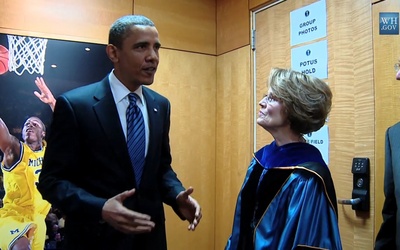University of Michigan President Mary Sue Coleman to lead U.S. innovation council
University of Michigan President Mary Sue Coleman will co-chair a new council formed by the U.S. Department of Commerce to spark economic development through technology and early-stage business ideas, an Obama administration cabinet member said this morning in Ann Arbor.
Coleman will co-chair the National Advisory Council on Innovation and Entrepreneurship, U.S. Secretary of Commerce Gary Locke announced at an "innovation forum" at U-M.
Locke praised U-M's efforts to generate economic activity with its basic research. But he said many universities struggle to do the same.

University of Michigan President Mary Sue Coleman -- pictured with President Barack Obama at U-M's commencement ceremony May 1 -- will co-chair the National Advisory Council on Innovation and Entrepreneurship for the U.S. Department of Commerce.
Photo courtesy of White House
"We’re not doing a good enough job of getting those ideas into the marketplace," Locke said. "What we need to do is get better at connecting the great ideas to the great company builders."
The National Advisory Council consists of entrepreneurs, investors and nonprofit leaders who will play a "key role in advising us on innovation and entrepreneurship policies," Locke said. It will focus on generating ideas on how to improve the technology commercialization process at universities and federal laboratories.
Coleman's co-chairs on the 26-person council are A123Systems chairman Desh Deshpande and AOL co-founder Steve Case. (Also this morning, Coleman defended her membership on the Johnson & Johnson Board of Directors after the New York Times placed a spotlight on her relationship with the company.)
Coleman said universities must make a concerted effort to embrace their role in contributing toward the country's economic revitalization.
"We must hold open our doors to better link our ideas and activities with businesses both large and small to catalyze our growth and help commercialize activity. At the University of Michigan, we embrace this change and we are eager to help in the transformation," she said. "This environment is not inherent. It must be carefully guided, nurtured and rewarded by leaders."
Coleman also said that student entrepreneurs -- such as those leading companies in U-M's TechArb incubator -- can also play a key role in boosting the economy.
"This is the excitement, this is the future," she said. "We need to get out of the way and provide these young people a little bit of money and they will take it and run."
Locke said universities need to improve their technology commercialization processes.
"It’s very, very uneven across the colleges and universities in America," he said.
The invitation-only forum, one of four conferences the Department of Commerce is hosting throughout the nation, attracted about 150 business leaders, university officials and entrepreneurs to share ideas on how to address technology challenges and opportunities.
Dwight Carlson, CEO of Ann Arbor-based tech company Coherix, said early-stage companies need funding help to accelerate research licensed from universities.
"We have a wonderful research university. In my opinion, it has more money than the almighty," Carlson said. "Research in America is not the problem. The problem is the ability to fund the implementation of research."
Dawn White, CEO of Ann Arbor-based wind energy technology startup Accio Energy, called on the Department of Commerce to provide funding to Ann Arbor SPARK, an economic development group. She said SPARK could make better decisions on which local companies deserve grants than the bureaucrats in Washington.
"They know the people, they’ve seen us, we come to their events," White said. "It’s not a completely distant review proess. They know these people, and they know who’s crazy and who’s not."
SPARK, which provides services to many university startup companies, has received virtually no money from the federal government, CEO Michael Finney said.
"If we don’t provide those early resources that they need, they simply won’t happen," Finney said.
Contact AnnArbor.com's Nathan Bomey at (734) 623-2587 or nathanbomey@annarbor.com. You can also follow him on Twitter or subscribe to AnnArbor.com's newsletters.


Comments
Thomas Hunt
Fri, Jul 16, 2010 : 4:32 p.m.
The inability of UM to partner effectively with private companies should be a major scandal. Nearly a billion dollars in research and development funding at UM produces truly miniscule economic benefit to either the University or the public, as examination of the public record can prove. A major part of the problem is the U's policy approach for "cooperating" with entrepreneurs. I have personal experience with the discovery of UM involvement with a project killing a prospective deal with a major company because the University is well known to be simply too difficult to deal with.
Cash
Tue, Jul 13, 2010 : 5:12 p.m.
For a part-time president, she sure makes big bucks.
trespass
Tue, Jul 13, 2010 : 1:38 p.m.
She just struck a deal with Shanghai Jiao Tong University to partner with them to develop new technologies. Who benefits from that? Show the public the agreement so that we can see for ourselves. This sounds like the fox guarding the chicken coup.
russellr
Tue, Jul 13, 2010 : 12:02 p.m.
Kinda scares me with her just going to China. Good Idea if our jobs don't go over there. Keep our jobs is the USA.